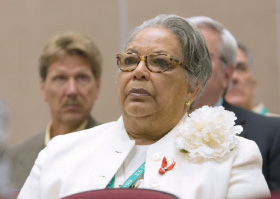Hide-and-Seek With Vilma Leake
 Lee Ann Patton has been trying to track down Vilma Leake.
Lee Ann Patton has been trying to track down Vilma Leake.
Patton, the Republican candidate who faces Leake in November’s election for the District 2 seat on the Mecklenburg Board of County Commissioners, needs to contact her Democrat opponent about participating in the League of Women Voters’ debate.
If Leake can’t be contacted and convinced to take part in the debate, there won’t be one. Patton, a long-shot candidate in a district that leans heavy Democrat, said the debate would give voters an opportunity to see important distinctions between herself and Leake, and said she suspects that’s exactly why Leake has been dodging any commitment to participate.
“Debates are a good way for voters to get an unfiltered look at the candidates,” Patton said. “It’s discouraging, but not really surprising, that Vilma doesn’t want to give the public as many opportunities as possible to learn about the issues.”
Patton’s campaign manager has tried calling and e-mailing Leake, to no avail. And she’s not alone. The debates director for the League of Women Voters (LWV) Charlotte-Mecklenburg, Amanda “Boo” Raymond, has run into a similar dead end.
“I have phoned her several times, but the machine says it is full and will not accept any messages and she has never answered,” Raymond wrote in an e-mail to Patton regarding efforts to contact Leake about participating in the debate. Attempts to reach Leake by e-mail proved similarly fruitless.
“If you have soem (sic) way to contact her I would appreciate it,” Raymond wrote to the Patton campaign, “otherwise the debate will be cancelled.”
If that’s the case, Patton said she should still be able to use the opportunity to share her views and positions with voters, using some format without Leake present. That’s not likely to happen, Raymond said. A long-standing LWV policy is that unless at least two candidates agree to participate, the event is cancelled.
“It becomes too much like an infomercial if you just have one candidate,” Raymond said.
That isn’t sitting well with Patton.
“It’s absolutely crazy,” she said. “It’s like I’m being punished for wanting to address the issues, while my opponent is being rewarded for dodging them. I think it’s a real disservice to the voters.”
Leake, keeping true to form, did not respond to attempts to contact her for this article.
This isn’t the first time the LWV has had problems corralling Leake into one of its debates. Raymond couldn’t recall a single time Leake participated in a League-sponsored debate during her decade-long stint on the school board representing District 2.
An elusive Leake, though, might be the least of the LWV’s headaches this election season. The League is also coming under criticism for its decision to scuttle the traditional debate format for candidates running at-large for a seat on the board of commissioners. Instead, the LWV will tape 15-minute interviews with each candidate and air them individually. That isn’t being favorably received by Republican candidates, who viewed a potential debate as an opportunity to challenge and highlight what they say are misguided policies and priorities set by incumbent at-large Democrats running for reelection.
“It’s crazy,” said Jim Pendergraph, one of three Republican candidates running at-large. “We should get the chance to face our opponents in a live setting, where the public has an opportunity to see us in action against each other. That’s the whole purpose of debates.”
Pendergraph is joined on the GOP at-large ticket by Dan Ramirez and Corey Thompson. Incumbent commissioners Jennifer Roberts, Dan Murrey and Harold Cogdell fill the Democrat slate. Whichever party can win a majority of the three at-large seats up for grabs will likely also win majority control of the board, which is currently held by Democrats.
“I just find it ironic,” Thompson said of the LWV’s decision to abandon the debate format for the at-large race. “Especially this year, especially with the competitive slate of candidates on the ballot. It doesn’t seem to make a whole lot of sense.”
Raymond said the decision to run with one-on-one interviews was made mainly because the traditional debate-style format had grown stale, particularly in races, like the at-large commissioners tilt, where there are several candidates involved.
“What we found is that the candidates usually end up giving the same response to each question,” Raymond said. “It doesn’t always make for an interesting debate. By the time you get to the third or fourth candidate on a topic, the ground has already been covered and you don’t see much difference in any of the responses.”
The LWV used taped interviews with candidates instead of holding an actual debate during the last school board election because of the large field of candidates, Raymond said, and was satisfied with the format.
She said questions the at-large commissioners candidates will be asked during the taped interviews would be the same as the ones that would have been used during a debate.
“It makes them (candidates) pull from their own knowledge base, instead of just repeating something they just heard another person say who answered before them in a debate,” Raymond said. “We think there’s value in that approach.”
Pendergraph remains skeptical about the taped-interview format.
“I don’t like it – at all,” he said. “You really don’t get a chance to see the candidates in action, challenging each other on the issues and their positions. All you’re going to get is a bunch of canned responses. I can’t figure out the logic of it.”
 We need your help! If you like PunditHouse, please consider donating to us. Even $5 a month can make a difference!
We need your help! If you like PunditHouse, please consider donating to us. Even $5 a month can make a difference!
Short URL: https://pundithouse.com/?p=3307


